He takes his sweet time to answer your queries but the politeness in his voice is unmistakable. Habib Faisal, whose last directorial venture was Ishaqzaade, is thrilled to be part of Sundance Institute's initiative that has shortlisted eight promising scripts out of 500 entries.
He's one of the nine mentors along with Anjum Rajabali, Asif Kapadia and others. In a candid chat, Habib talks about cinema, writing and directing.
You're mentoring eight young filmmakers. How do you plan to go about it?
I don't have a set programme or anything. I'll just go with the flow and try to share whatever I can with them. Since they are keen on directing the film they themselves wrote - something I myself do - I look forward to learning from them too.
Between writing and directing, what is more challenging?
Directing definitely is because it's not something you do entirely on your own. You deal with different people with different mindset and they could could be in a bad mood or PMSing or too happy or distracted. Writing is primarily an individual work.
As a writer, you deal with the director. That's it. Also as a writer, if the film fails, you can blame it on the director but as a director, I can't blame it on anybody else (laughs).

And what do you enjoy more?
They are two distinct things but I'll say I enjoy both of them equally. To put things in perspective, I've made it a habit now of writing for someone else after directing my film. I wrote Band Baaja Baaraat after Do Dooni Chaar and post-Ishaqzaade, I've written a not-yet-titled film which is being directed by Nupur Asthana.
Why is it still untitled?
See, the process of arriving at a name for any film is quite complex. By the time, the third draft of a script is ready, we get a title organically but it always doesn't work that way. There are a number of people contemplating the same name as you are and sometimes they have already owned the title. The same is somewhat true about our upcoming film and we're trying to figure it out.
A lot of forthcoming stories in Hindi film industry are moving away from urbane landscapes. Why so?
I think it's a cycle; not entirely formulaic. If you remember, when Deewar happened, it focussed mainly on city life and opened the door for similar plots to hit the big screen.
A good mix of both urban as well as not-so-urban stories is what is required and thankfully, it's happening. For instance, Zoya Akhtar made a city-centric Luck By Chance and followed it up Zindagi Na Milegi Dobara that had an international feel. For me, that's balance.

Is it incumbent on filmmakers to deliver a message through films?
Not at all. It depends on the director. For some of us, entertainment itself is the be-all-and-end-all. For others, their work should trigger some thoughts and questions. Like Raju Hirani is one of those rare filmmakers who combine both very effectively.




















